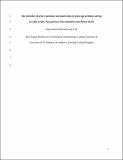The interplay of prior experience and motivation in great ape problem-solving (Gorilla gorilla, Pan paniscus, Pan troglodytes, and Pongo abelii)
Abstract
Many primate species have a strong disposition to approach and manipulate objects in captivity. However, few studies have investigated what primates learn during free exploration of objects in the absence of rewards, and how previous problem-solving performance influences subsequent exploration. We confronted members of each of the four nonhuman great ape species (N = 25) with the collapsible platform task that required subjects to drop a stone inside a tube to collapse a platform and release a reward. Subjects received four successive sessions with an empty apparatus (exploration driven by intrinsic motivation) followed by four with a baited apparatus (problem-solving driven by extrinsic motivation) or vice versa. Apes who first faced an empty apparatus solved the task more quickly in the baited condition than apes who started with this condition. Moreover, apes starting with the baited condition took longer to collapse the platform in the first trial than apes who started with the empty condition. This study suggests that apes exposed to an empty apparatus before the test gain information that is later used to solve the task in a more efficient manner. Thus, apes learn about action-outcome contingencies during free exploration. Moreover, it indicates that the presence of food rewards distracts apes and delays problem-solving because apes' attention is mainly focused on the food.
Citation
Ebel , S J & Call , J 2018 , ' The interplay of prior experience and motivation in great ape problem-solving ( Gorilla gorilla , Pan paniscus , Pan troglodytes , and Pongo abelii ) ' , Journal of Comparative Psychology , vol. 132 , no. 3 , pp. 294-305 . https://doi.org/10.1037/com0000117
Publication
Journal of Comparative Psychology
Status
Peer reviewed
ISSN
0735-7036Type
Journal article
Description
This research was funded by Max Planck Society.Collections
Items in the St Andrews Research Repository are protected by copyright, with all rights reserved, unless otherwise indicated.

